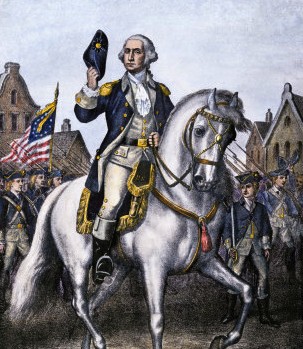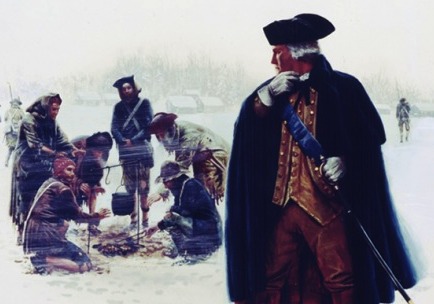After Yorktown: The Integrity of George Washington
Dan Bryan, May 14 2012
George Washington, as much as he is lionized, is often not given the full credit due to him for his efforts at holding the United States together as a republic in the aftermath of the victory at Yorktown.
The famous defeat of Cornwallis did not immediately end the war. For a time it was unclear whether the British would relent, or whether they would send another army to North America and continue to press the conflict. In this interval, most of the Continental Army remained mobilized and camped at Newburgh, New York. Many of them had not been paid in years. They were ill-clothed, poorly fed, and gradually slid into various degrees of distemper.
It took remarkable skill and leadership by George Washington to prevent this situation from escalating into a rebellion against the Congressional government. Had he been of a different mindset, he probably could have exploited the situation to his personal gain, installing himself as leader of the new country. His refusal to do so is a centerpiece of his long legacy.
The Nicola Letter
The first incident of note occurred in 1782, in the form of a long, hand-written letter. A colonel named Lewis Nicola gave his own impression of the political situation to General Washington. He pointed out that many officers and soldiers had agreed not to disperse until their grievances were met. He used several pages to point out the shortcomings of republican government when it came to compensation of the military. He pointed out all of the threats to social order that this entailed.
Then, at the end, Nicola revealed his proposal -- the United States as a monarchy. Only a government of this type, he argued, could ensure proper compensation to the Continental Army and prevent a future rebellion. The obvious implication, of course, would be George Washington as king.
Washington may or may not have had the support to implement such an idea, but he certainly could have tried. Instead his response was brief and severe:
"I am much at a loss to conceive what part of my conduct could have given encouragement to an address which to me seems big with the greatest mischiefs that can befall my Country... Let me conjure you then, if you have any regard for your Country, concern for yourself or posterity, or respect for me, to banish these thoughts from your Mind, and never communicate, as from yourself, or any one else, a sentiment of the like Nature."
Nothing else was heard of a monarchy from Nicola or any other officer.
The Newburgh Conspiracy
A more substantial threat emerged in early 1783 that came to be known as the Newburgh Conspiracy. Some officers perceived Washington as too moderate when it came to pressing their demands with the Congress. They devised a scheme to replace Washington and to march towards Philadelphia, to demand more aggressive action from the Continental Congress.
Washington got wind of these efforts, and he knew that decisive action was needed to squelch them in their infancy. On March 15th he summoned his officers to a central location and acknowledged the existence of this faction. In defense, he gave a poignant speech about their collective sacrifices. At a key moment, he famously searched his pocket for some spectacles and said, "Gentlemen, you must pardon me. I have grown old in the service of my country and now find that I am growing blind."
Some of Washington's supporters were moved to tears by the end of the speech. Washington reiterated his promise to pursue the interests of the officers within the republican system, if they too would renew their faith in it. After this, the Newburgh Conspiracy collapsed.
The dissatisfaction of the enlisted men
The officers were not the only men who were upset. At least as worrisome were the enlisted men. Of these there was a much higher number, and the debts incurred to them were collectively greater. Throughout the war these men had slept in fields, with rocks for pillows, and been so poorly clad that their bare feet left the snow red in the winter when they marched.
Pay was years behind schedule. Other promises had been made to many of the men when they enlisted -- mainly of bonuses and future land grants. Now it seemed that there was no way that Congress would make good on these obligations. Some soldiers simply deserted. Others declared that they would refuse to disperse from Newburgh until something more was done for them.
On June 21, 1783, eighty troops from the Third Pennsylvania Regiment surrounded the Continental Congress in Philadelphia, poking their muskets through the windows at the likes of James Madison and Alexander Hamilton. Their intent was more to make a point than to threaten lives, but the Congress was forced to abscond to Princeton for a time. The episode underscored the danger inherent in the grievances of the enlisted men.
The Treaty of Paris and the discharge of the Army
It was not until the Treaty of Paris was signed on September 3, 1783 that the United States was formally recognized as an independent country, and the British agreed to withdraw their forces from the new nation. At this point, all but a few hundred men were discharged from the Army.
The officers ended up receiving a 5 year pension, at the full value of their wartime salary. This was a compromise, granted in lieu of a lifetime payment, but it was apparently sufficient. There were also land districts set up in the west -- particularly in Ohio. That future state would be heavily settled by Revolutionary War officers through the end of the 1700s.
The best that could be done for the enlisted men was to issue some bonds, redeemable in the future when the United States got its finances in order. Most of the soldiers were loyal and had no great desire to foment trouble, but at the same time, a long-term bond would cover few of their pressing needs, such as physically making the journey from New York to whatever state was home.
Upset by the impotence of the Congress, Robert Morris raised the money for a final payment for the Continental soldiers in Newburgh. It was enough to cover roughly one month of salary -- when most of them were owed for several years.
Many of the soldiers walked home for hundreds of miles without so much as a dollar to their name. The apparently worthless bonds they held were quickly sold to speculators at low prices, just to pay for necessities. It would hardly be unfair to wonder what they had gained from the whole experience, other than risk of life and limb.
Legacy of the Revolutionary War during the Articles of Confederation
For his part, Washington did advocate for a stronger central government, which might be more effective in making good on its promises to the army. The massive debt owed to these soldiers by the decentralized Confederation immediately became a pressing political issue in the new nation.
Unfortunately, some of the Congressmen did not make the payment of the former soldiers a very high priority. There was a deep strain in American political thought at that time that distrusted anything related to the military, and also the centralization in finances and taxation that would be required to address this debt. Under the Articles of Confederation, unanimous consent was needed for nearly any order of business, and the result was paralysis.
This complete inability to pay the Continental Army -- even though the existence of the nation was directly dependent upon its efforts -- became one of the darkest marks against the Articles of Confederation government. Throughout the 1780s a number of controversies would arise along this issue, until many began to doubt the efficacy of the Confederation itself.
Recommendations/Sources
- Joseph Plumb Martin - A Narrative of a Revolutionary Solider
- Woody Holton - Unruly Americans and the Origins of the Constitution
- Richard B. Morris - The Forging of the Union, 1781-1789 (New American Nation Series)



